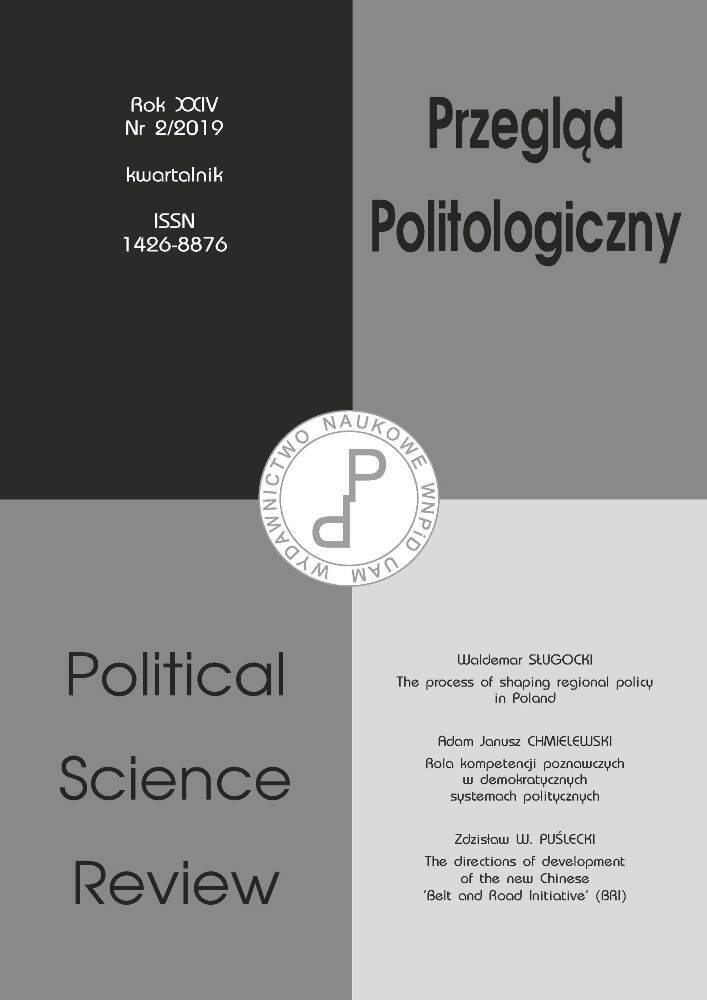Abstract
Taking as the starting the normative ideal of democracy, grounded in an inclusive understanding of the subject point of democracy, the author argues that various concepts of democracy assign particularly important role to cognitive competences and see it as an exclusive entitlement to participate in the exercise of political power in democratic systems. The case in point is contemporary debate on the proper understanding of democracy which focuses on the dilemma between, on the one hand, the idea of broad participation of the people in the democratic governance, and, on the other, the deliberative ideal which presupposes that power in these systems should be entrusted only to people with appropriate cognitive competences. The author analyzes the main elements of “cognitocratic” or “epistocratic” conceptions and points out to potential perils resulting from the attribution of a prominent role in the theory of democracy to cognitive competences. In opposition to cognitocratic approaches, both in their universalist and elite versions, the author argues that a more adequate understanding of governance in democratic systems should instead be based on the wider category of political ability. He also claims that a novel definition of this category should be informed by the normative ideal of democracy which is based on the recognition of potentially universal capabilities to develop the political ability and that this potential may in fact be activated through the actual participation in democratic politics.
References
Adams D. (1987), Dirk Gently’s Holistic Detective Agency, Gallery Books New York.
Bobbio N. (1998), Liberalizm i demokracja, przekł. P. Bravo, Znak – Fundacja im. Stefana Batorego, Kraków–Warszawa.
Böckenförde E.-W. (1976), Staat, Gesellschaft, Freiheit, Suhrkamp, Frankfurt.
Boetie E. de la (1975), The Discourse of Voluntary Servitude, trans. H. Kurz, The Mises Institute, Auburn, Alabama.
Chmielewski A. (2005), Dwie koncepcje jedności. Interwencje filozoficzno-polityczne, Oficyna Branta, Bydgoszcz–Wrocław.
Chmielewski A., Psychopatologia życia politycznego. Podręcznik ilustrowany, Oficyna Wydawnicza Atut, Wrocław 2009.
Dziubka K. (2008), Obywatelskość jako virtú podmiotu demokracji, Wydawnictwo Uniwersytetu Wrocławskiego, Wrocław.
Ferguson A. (1995), An Essay on the History of Civil Society, red. F. Oz-Salberger, Cambridge University Press.
Gajda J. (1986), Prawo natury i umowa społeczna w filozofii przedsokratejskiej, Wydawnictwo Uniwersytetu Wrocławskiego, Wrocław.
Gray J. (1995), Isaiah Berlin: An Interpretation of His Thought, HarperCollins.
Grygieńć J. (2017), Demokracja na rozdrożu. Deliberacja czy partycypacja polityczna?, Universitas, Kraków.
Hayek F. A. von (1978), Errors of Constructivism, w: New Studies in Philosophy, Politics, Economics and the History of Ideas, Routledge and Kegan Paul, London.
Hayek F. A. von (1978), Whither Democracy, w: New Studies in Philosophy, Politics, Economy and the History of Ideas, Routledge and Kegan Paul, London.
Krastev I. (2006), The new Europe: respectable populism, clockwork liberalism, „Open Democracy”, 21 March.
Lasch C. (1997), Bunt elit, przekł., D. Rodziewicz, Platan, Kraków.
Lincoln A. (1998), Gettysburg Address, w: Speeches that Changed the World, HarperCollins, New York.
MacIntyre A. (2008), How Aristotelianism Can Become Revolutionary: Ethics, Resistance, and Utopia, „Philosophy of Management”, vol. 7, nr 1, ss. 3–7.
Ost D. (2007), Klęska „Solidarności”. Gniew i polityka w postkomunistycznej Europie, przekł. H. Jankowska, Warszawskie Wydawnictwo Literackie Muza S. A., Warszawa.
Popper K. (1993), Społeczeństwo otwarte i jego wrogowie, PWN, Warszawa.
Rousseau J.-J. (2002), Umowa społeczna, przekł. A. Peretiatkowicz, Antyk, Kęty.
Strauss L. (1987), Plato, w: L. Strauss, J. Cropsey, History of Political Philosophy, The University of Chicago Press, Chicago–London.
Surowiecki J. (2005), The wisdom of crowds: why the many are smarter than the few and how collective wisdom shapes business, economies, societies, and nations, Random House, New York.
Swenson K. (2018), Rebekah Mercer, the billionaire backer of Bannon and Trump, chooses sides, “The Washington Post,” Jan. 5, https://www.washingtonpost.com/news/morning-mix/wp/2018/01/05/rebekah-mercer-the-billionaire-backer-of-bannon-and-trump-choosessides/?utm_term=.05dca59279d5, 25 maja 2018.
Tukidydes (1957), Wojna peloponeska, przekł. K. Kumaniecki, Czytelnik.
Žižek S. (2001), Przekleństwo fantazji, przekł. A. Chmielewski, Wydawnictwo Uniwersytetu Wrocławskiego.

